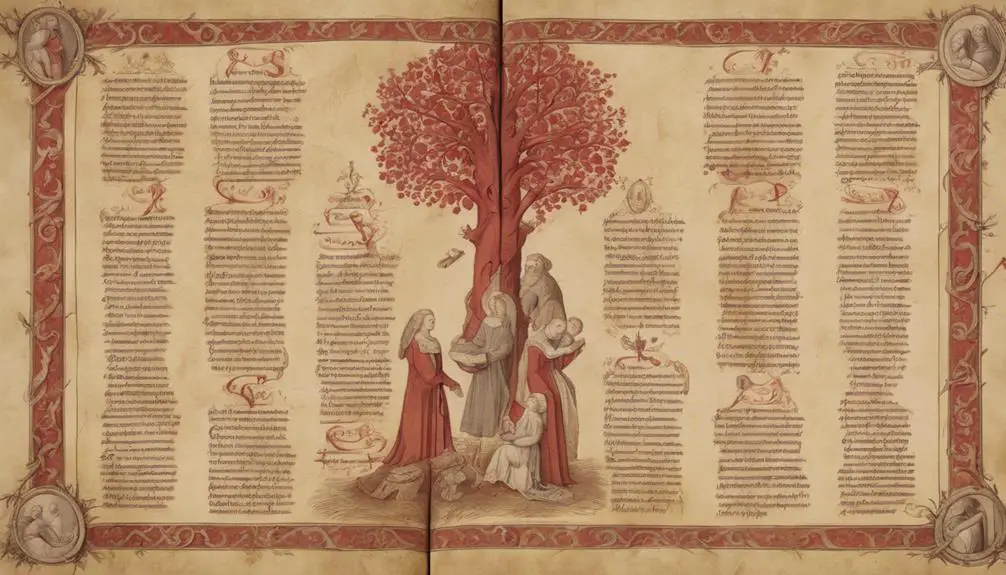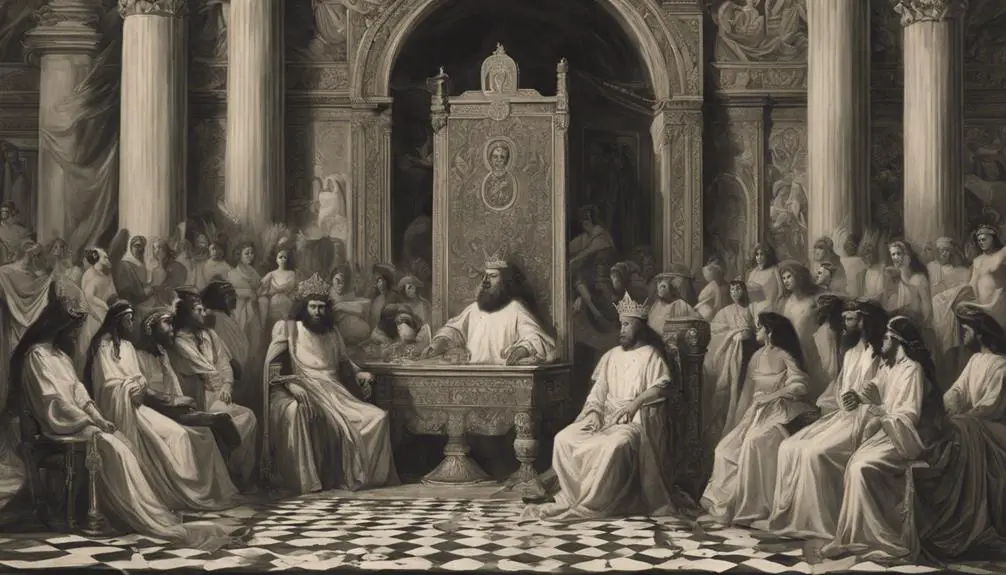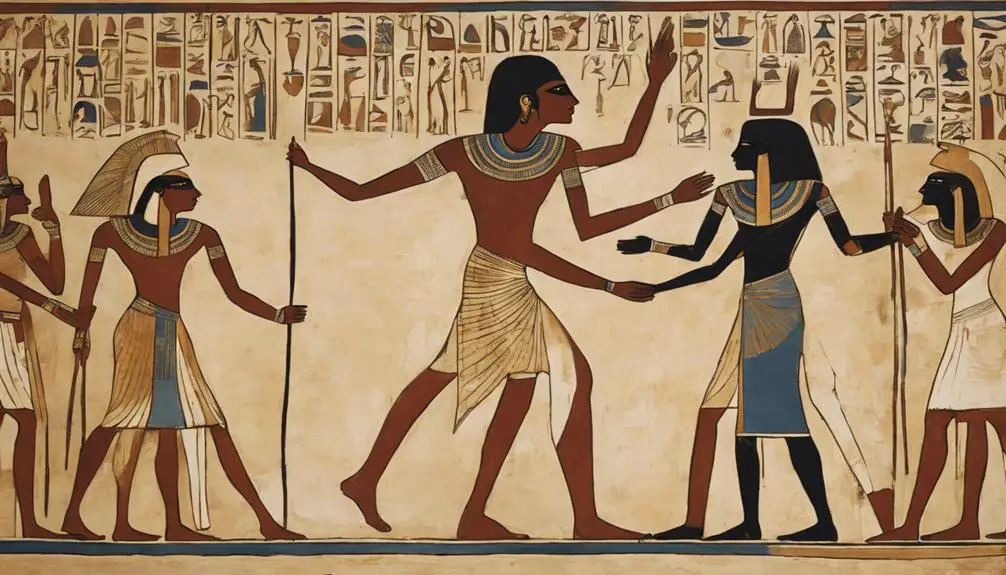Learn about the surprising list of adulterers in the Bible, and explore the complex stories of temptation, consequences, and divine forgiveness.

List of Adulterers in the Bible
In the sacred scriptures, the stories of saints and sinners coexist, creating a complex tapestry of human frailties and divine forgiveness.
You've likely heard of David's temptation, Bathsheba's complicated story, and Solomon's many missteps, but have you ever really considered the implications of these narratives?
We're going to unpack the tales of these biblical characters, their adulterous acts, and the consequences that followed.
So, are you ready to explore these not-so-virtuous aspects of the Good Book? Let's dive in and see what we can unearth.
Key Takeaways
- King David's misuse of power led to adultery with Bathsheba and deceptive murder of Uriah.
- Delilah's manipulation and betrayal of Samson resulted in his downfall and capture.
- Solomon's numerous marriages and idolatry led to his spiritual corruption and fall from grace.
- Abraham's impatience resulted in an affair with Hagar, causing family discord and ongoing strife.
King David's Temptation

In one of the most dramatic episodes in the Bible, you'll find King David, a man after God's own heart, succumbing to the temptation of adultery with Bathsheba. This isn't just a tale of lust, but a complex narrative of power misuse, deception, and ultimately, repentance.
David's repentance is a pivotal part of this story. After the prophet Nathan's rebuke, David acknowledges his sin and pleads for God's forgiveness in Psalm 51. You see a man, once swayed by temptation, now broken and contrite, realizing the gravity of his actions. His heartfelt repentance underscores the extent of his transgressions and the depth of his remorse.
But let's not forget Uriah's murder. David, in an attempt to cover up his adultery, orders Uriah to the front lines of a heated battle, ensuring his death. This act of calculated brutality adds another dark layer to David's downfall. Uriah's murder reflects David's desperate attempts to maintain a façade of righteousness, further escalating the magnitude of his sins.
Through David's temptation, you witness not only the susceptibility of even the 'man after God's own heart' to sin, but also the profound consequences and the possibility of genuine repentance.
Bathsheba's Complicated Story

Turning our attention to Bathsheba, her narrative is one fraught with complexity and intrigue. Her story, often seen through the lens of King David's lust, raises questions about Bathsheba's innocence and Uriah's tragedy.
Consider the context: Bathsheba, a beautiful woman, was bathing when she caught the eye of King David. Despite knowing she was married to Uriah, David pursued her. Bathsheba's innocence lies in the power imbalance. Could she have refused the king without consequences?
Then there's Uriah's tragedy. Loyal to the king, he was away at war while David was with his wife. His death, orchestrated by David, deepens the complexity of the situation.
To help you better understand, here's a table:
Keywords |
Insights |
|---|---|
Bathsheba's Innocence |
Bathsheba was a subject to David's desires, raising questions about her ability to refuse the king. |
Uriah's Tragedy |
Uriah, a loyal soldier, was sent to his death by the king who bedded his wife. |
Bathsheba's story is more than an affair. It's a tale of power dynamics, manipulation, and tragic loss. Yet, in all its complexity, it remains a poignant reminder of human fallibility and the consequences of unchecked desires.
Delilah and Samson's Betrayal
Just as Bathsheba's tale is marked by manipulation and betrayal, so is the story of Samson and Delilah, which offers another perspective on adultery in the Biblical narrative. Delilah, a woman from the Valley of Sorek, was used by the Philistines to bring about Samson's downfall. In exchange for silver, she agreed to discover the secret of Samson's strength, a secret that was tied to his Nazirite vow to God.
Delilah's manipulation is evident in her repeated attempts to get Samson to reveal his secret. She uses emotional blackmail, accusing him of not loving her when he refuses to tell her. Eventually, Samson is worn down by her constant nagging and reveals his secret, that his strength lies in his uncut hair.
Samson's downfall comes swiftly after this revelation. Delilah cuts his hair while he sleeps, effectively breaking his vow and leaving him vulnerable. The Philistines capture him, gouge out his eyes, and make him a spectacle. Samson's story, marked by betrayal and manipulation, serves as a stark warning about the dangers of adultery and the catastrophic consequences of breaking one's vows.
Solomon's Many Missteps

While Samson and Delilah's story serves as a stark cautionary tale, Solomon's biblical narrative paints a complex picture of a man led astray by his numerous wives and concubines. Despite being granted unparalleled wisdom by God, Solomon's misuse of his wisdom led him into the path of idolatry, fueled by his numerous marriages.
Key Missteps |
Consequences |
|---|---|
Solomon's Idolatry |
Alienation from God |
Wisdom Misuse |
Fall from Grace |
Numerous Marriages |
Spiritual Corruption |
Solomon's idolatry was a significant downfall. Unlike his father David, who was a man after God's own heart, Solomon allowed his wives to turn his heart after other gods. Each idolatrous act distanced him further from his original, divine wisdom.
His wisdom misuse is another critical point. Instead of using it to maintain a close relationship with God, he used it to amass wealth and wives, thus straying from God's path.
Lastly, his numerous marriages were his spiritual downfall. These unions, mainly political alliances, led him to worship his wives' gods, violating God's commandment.
Thus, Solomon's story serves as a potent warning about the dangers of putting worldly desires before Godly obedience.
Abraham and Hagar's Affair

In examining the narrative of Abraham and Hagar's affair, you'll find a profound lesson on the consequences of disobedience and lack of faith in God's promises. Abraham, impatient for God's promise of a son, succumbs to the persuasions of his wife, Sarah, and sleeps with her Egyptian servant, Hagar.
Here, let's delve into the three key aspects of this narrative:
- Hagar's Influence: Hagar, once pregnant, began to despise Sarah. Her elevated status in the household created tension that ultimately led to her expulsion.
- Abraham's Regret: Abraham's decision to take matters into his own hands led to regret and discord within his family, demonstrating the pitfalls of straying from God's path.
- The Consequences: The affair resulted in the birth of Ishmael, whose descendants have been in strife with Isaac's offspring even to this day.
This narrative serves as a reminder that our actions carry weight and can have long-lasting effects. Abraham's regret over his affair with Hagar is a poignant example of the distress that can result from succumbing to impatience and disregarding God's promises.
Potipar's Wife and Joseph

Turning our attention to the story of Potipar's wife and Joseph, we find another compelling example of adultery's detrimental effects in the Bible. Here, Joseph's integrity takes center stage as he resists the advances of Potipar's wife, showcasing his moral fortitude and commitment to righteousness.
Potipar's wife's motivation, however, is driven by lust and desire. You see her determined pursuit of Joseph, a young, handsome servant in her household. Despite his repeated refusals, she remains undeterred, embodying a persistence that's both admirable and troubling.
When her advances are continually rebuffed, she turns vindictive. This is where the story takes a dark turn. Her false accusation of rape lands Joseph in prison, demonstrating the destructive consequences of her unrequited lust. Yet, throughout the ordeal, Joseph's integrity never wavers, further emphasizing his moral strength.
In this narrative, you're shown how adultery, or even the intent of it, can lead to dire repercussions. It also highlights how maintaining one's integrity, like Joseph, is crucial in navigating through such challenges. The tale of Potipar's wife and Joseph serves as a stark reminder of the complexities and consequences tied to lust, deceit, and integrity.
Frequently Asked Questions
What Are the Societal and Cultural Implications of Adultery in Biblical Times?
In biblical times, adultery had profound societal and cultural implications. It challenged traditional gender roles, often leading to severe punishments for women. Men's transgressions, however, were sometimes overlooked, reflecting societal power imbalances.
Adultery's impact on marriage was also significant, often leading to public shaming and dissolution of the marital bond. It's crucial to understand these historical perspectives to fully grasp the Bible's teachings on adultery.
How Does the Concept of Adultery in the Bible Compare to Modern Views on Adultery?
When you compare biblical views on adultery to modern perspectives, there's a shift. The Bible uses marital fidelity as symbolism for faithfulness to God. Adultery's psychological impact was severe, often leading to societal shaming and punishment.
Today, while the psychological impact remains, society's view has softened. Adultery is generally seen as a breach of trust, but responses vary widely, reflecting more individualistic and less universally condemning attitudes.
Are There Any Consequences Mentioned in the Bible for Those Who Committed Adultery?
Yes, the Bible does indeed mention consequences for those who commit adultery. It speaks of the act's spiritual impact, linking it to sin and separation from God.
However, it also emphasizes divine forgiveness in adultery, illustrating that repentance can lead to reconciliation.
It's vital to note, though, that this doesn't negate the seriousness of the act or the damage it can inflict on relationships and communities.
How Does the Bible's Portrayal of Adultery Affect Contemporary Religious Teachings and Practices?
You're examining how the Bible's portrayal of adultery impacts contemporary religious teachings and practices.
Adultery's impact on biblical marriages has significantly shaped our modern understanding of morality. It serves as a stern warning, influencing believers to uphold the sanctity of marriage.
Consequently, the Bible's depictions of adultery continue to guide moral behavior, shaping societal norms and personal convictions in today's religious practices.
Besides the Characters Mentioned, Are There Other Less-Known Figures in the Bible Who Committed Adultery?
Indeed, there are lesser-known biblical figures who committed adultery. Consider King David's son, Amnon, who violated his half-sister, Tamar.
This isn't just historical recounting; it's also adultery symbolism in parables, shedding light on societal norms and implications for gender roles. It's a cautionary tale, urging you to uphold the sanctity of relationships and respect for each other's boundaries, regardless of status or gender.
Conclusion
In conclusion, you've seen how even revered figures in the Bible, including King David, Solomon, and Abraham, fell into the trap of adultery.
You've also seen the complex situations surrounding Bathsheba and Delilah.
Lastly, you've observed Joseph's righteous stand against temptation from Potipar's wife.
These stories remind us of human fallibility, the importance of moral integrity, and the enduring need for forgiveness and redemption.



Sign up